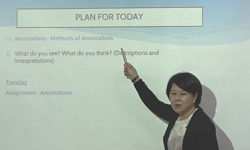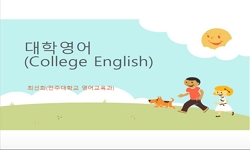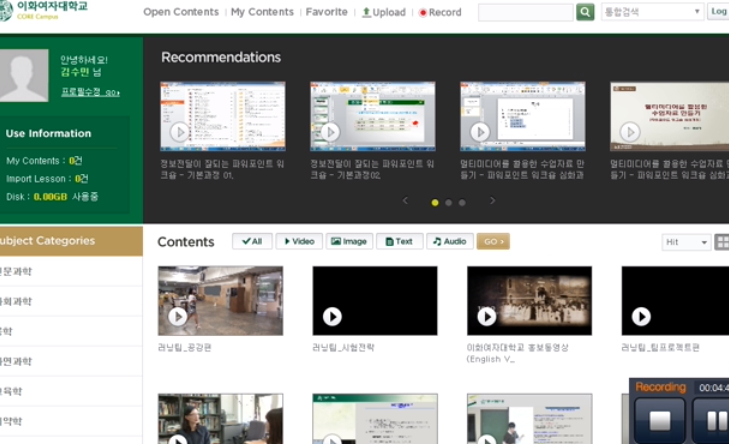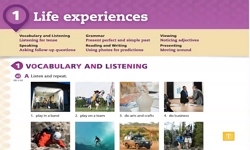The purpose of this paper was to investigate the effects of think-aloud strategy with feedback on low-achieving readers in college reading classrooms. Thirty three participants out of 124 students from the four groups were selected as low-achieving re...
http://chineseinput.net/에서 pinyin(병음)방식으로 중국어를 변환할 수 있습니다.
변환된 중국어를 복사하여 사용하시면 됩니다.
- 中文 을 입력하시려면 zhongwen을 입력하시고 space를누르시면됩니다.
- 北京 을 입력하시려면 beijing을 입력하시고 space를 누르시면 됩니다.

A Study of Think-aloud Strategy with Feedback on Reading Comprehension for Low-achieving College EFL Readers
한글로보기https://www.riss.kr/link?id=A106335206
- 저자
- 발행기관
- 학술지명
- 권호사항
-
발행연도
2019
-
작성언어
English
-
주제어
Reading Strategy ; Think-aloud ; College English ; 독해 전략 ; 사고 구술 ; 대학 영어
-
등재정보
KCI등재
-
자료형태
학술저널
-
수록면
27-57(31쪽)
-
KCI 피인용횟수
0
- DOI식별코드
- 제공처
-
0
상세조회 -
0
다운로드
부가정보
다국어 초록 (Multilingual Abstract)
The purpose of this paper was to investigate the effects of think-aloud strategy with feedback on low-achieving readers in college reading classrooms. Thirty three participants out of 124 students from the four groups were selected as low-achieving readers based on their reading comprehension scores. They were assigned with four groups: a control group, a think-aloud group with no feedback, a think-aloud group with implicit feedback, and a think-aloud group with explicit feedback. For implicit feedback, students’ think-aloud comments were indirectly corrected with specific codes while explicit feedback group received overt correction feedback. After one semester of research with 10 reading articles, low-achieving readers improved their overall scores on the reading comprehension post-test from the use of think-aloud with feedback. However, the overt, direct feedback group performed better than other groups. Although all feedback groups produced less wrong think-aloud statements, the explicit feedback group generated the least number of wrong think-aloud statements. The study sheds some light on the importance of explicit feedback in EFL classes.
참고문헌 (Reference)
1 오준일, "어휘 주석이 영어 읽기에 미치는 영향" 한국외국어교육학회 9 (9): 89-108, 2002
2 변지현, "교양영어 읽기전략 훈련의 효과분석" 한국교양교육학회 6 (6): 207-241, 2012
3 Cohen, A. D., "Verbal reports as a source of insights into second language learner strategies" 7 (7): 5-24, 1996
4 박용효, "Variables Influencing Korean College Students’ Strategy Use in Reading English Texts" 팬코리아영어교육학회 23 (23): 61-78, 2011
5 Oster, L., "Using the think-aloud for reading instruction" 55 (55): 64-69, 2001
6 Bereiter, C., "Use of thinking aloud in identification and teaching of reading comprehension strategies" 2 (2): 131-156, 1985
7 이경랑, "Triangulating Think-alouds and Questionnaires in Reading Strategy Assessment: An Exploratory Study" 한국영어교육학회 62 (62): 331-356, 2007
8 McKeown, R. G., "Think-aloud strategy : Metacognitive development and monitoring comprehension in the middle school second-language classroom" 51 (51): 136-147, 2007
9 Berne, J., "Think-aloud protocol and adult learners" 14 (14): 153-173, 2004
10 Hendrickson, J. M., "The treatment of error in written work" 64 : 216-221, 1980
1 오준일, "어휘 주석이 영어 읽기에 미치는 영향" 한국외국어교육학회 9 (9): 89-108, 2002
2 변지현, "교양영어 읽기전략 훈련의 효과분석" 한국교양교육학회 6 (6): 207-241, 2012
3 Cohen, A. D., "Verbal reports as a source of insights into second language learner strategies" 7 (7): 5-24, 1996
4 박용효, "Variables Influencing Korean College Students’ Strategy Use in Reading English Texts" 팬코리아영어교육학회 23 (23): 61-78, 2011
5 Oster, L., "Using the think-aloud for reading instruction" 55 (55): 64-69, 2001
6 Bereiter, C., "Use of thinking aloud in identification and teaching of reading comprehension strategies" 2 (2): 131-156, 1985
7 이경랑, "Triangulating Think-alouds and Questionnaires in Reading Strategy Assessment: An Exploratory Study" 한국영어교육학회 62 (62): 331-356, 2007
8 McKeown, R. G., "Think-aloud strategy : Metacognitive development and monitoring comprehension in the middle school second-language classroom" 51 (51): 136-147, 2007
9 Berne, J., "Think-aloud protocol and adult learners" 14 (14): 153-173, 2004
10 Hendrickson, J. M., "The treatment of error in written work" 64 : 216-221, 1980
11 Chall, J. S., "The reading crisis: Why poor children fall behind" Harvard University Press 1990
12 Leki, I., "The preferences of ESL students for error correction in college-level writing classes" 24 (24): 203-218, 1991
13 Stahl, S. A., "The effects of vocabulary instruction : A model-based meta-analysis" 56 (56): 72-110, 1986
14 Li, S., "The effectiveness of corrective feedback in SLA : A metaanalysis" 60 (60): 309-365, 2010
15 Bitchener, J., "The effect of different types of corrective feedback on ESL student writing" 14 (14): 191-205, 2005
16 Wigfield, A., "The development of children’s motivation in school contexts" 23 : 110-118, 1998
17 Walker, B. J., "The cultivation of student self-efficacy in reading and writing" 19 : 173-187, 1990
18 Block, E., "The comprehension strategies of second language readers" 20 (20): 463-494, 1986
19 박은화, "The Korean College Students’ Use of Writing Strategies Based on Self-Regulation" 외국어교육연구소 32 (32): 257-275, 2018
20 김지현, "The Editing and Learning Effects of Direct and Indirect Comprehensive WCF on L2 Grammar Accuracy Development" 외국어교육연구소 33 (33): 375-401, 2019
21 신혜원, "The Development of EFL Learners' Grammatical Accuracy with Repeated Written Corrective Feedback" 외국어교육연구소 32 (32): 291-312, 2018
22 Hudson, T., "Teaching second language reading" Oxford University Press 2007
23 Song, M. J., "Teaching reading strategies in an ongoing EFL university reading classroom" 8 (8): 41-54, 1998
24 Hapgood, S., "Teacher, text, and experience : A case of young children’s scientific inquiry" 13 (13): 455-505, 2004
25 Algozzine, K., "Staff development guide for middle school teachers" Macmillan McGraw Hill 201-205, 1997
26 Chern, C. L., "Second language reading and vocabulary learning" Ablex 67-85, 1993
27 Beck, I. L., "Revising social studies text from a text-processing perspective : Evidence of improved comprehensibility" 26 : 251-276, 1991
28 Palincsar, A. S., "Reciprocal teaching of comprehension-fostering and comprehension-monitoring activities" 1 (1): 117-175, 1984
29 Rosenshine, B., "Reciprocal teaching : A review of the research" 64 (64): 479-530, 1994
30 Pressley, M., "Reading instruction that works: The case for balanced teaching" Guilford 2006
31 Grabe, W., "Reading in a second language: Moving from theory to practice" Cambridge University Press 2009
32 Bakken, J. P., "Reading comprehension of expository science material and students with learning disabilities : A comparison of strategies" 31 : 300-324, 1997
33 Leslie, L., "Qualitative reading inventory-5" Pearson 2011
34 Pressley, M., "Promoting academic competence and literacy in school" Academic Press 91-127, 1992
35 Baker, L., "Metacognitive skills in reading" Longman 1984
36 Abraham, R. G., "Learner strategies in language learning" Prentice Hall 85-102, 1987
37 Koda, K., "Insights into second language reading : A cross-linguistic approach" Cambridge University Press 2005
38 Paris, S. G., "Informed strategies for learning : A program to improve children’s reading awareness and comprehension" 76 (76): 1239-1252, 1984
39 Silvén, M., "Improving reading through thinking aloud" 2 (2): 69-88, 1992
40 Nassaji, H., "Higher–level and lower–level text processing skills in advanced ESL reading comprehension" 87 (87): 261-276, 2003
41 Williams, J. P., "Handbook of metacognition in education" Routledge 26-43, 2009
42 Wigfield, A., "Handbook of child psychology: Social, emotional, and personality development (Vol. 3)" Wiley 933-1002, 2006
43 McLaughlin, M., "Guided comprehension: A teaching model for grades 3-8" International Reading Association 2001
44 Aebersold, J. A., "From reader to reading teacher:Issues and strategies for second language classrooms" Cambridge University Press 1997
45 Nicol, D. J., "Formative assessment and self-regulated learning : A model and seven principles of good feedback practice" 31 (31): 199-218, 2006
46 Carrell, P. L., "Facilitating ESL reading by teaching text structure" 19 (19): 727-752, 1985
47 Day, R. R., "Extensive reading in the second language classroom" Cambridge University Press 2007
48 임효정, "Exploring the Cognitive Validity of the iBT TOEFL Reading Test" 외국어교육연구소 30 (30): 231-258, 2016
49 Ferris, D., "Error feedback in L2 writing classes How explicit does it need to be?" 10 (10): 161-184, 2001
50 Hendrickson, J. M., "Error correction in foreign language teaching : Recent theory, research, and practice" 62 (62): 387-398, 1978
51 Fitzgerald, J., "English as a second language learners’ cognitive reading processes : A review of research in the United States" 65 : 145-149, 1995
52 Kolencik, P. L., "Encouraging metacognition: Supporting learners through metacognitive teaching strategies" P. Lang 2011
53 Zabrucky, K., "Effects of passage type on comprehension monitoring and recall in good and poor readers" 24 : 373-391, 1992
54 Duke, N. K., "Effective practices for developing reading comprehension" 189 : 107-122, 2008
55 Swanson, H. L., "Do semantic memory deficiencies underlie learning readers’ encoding processes?" 41 : 461-488, 1986
56 Best, R. M., "Differential competencies contributing to children's comprehension of narrative and expository texts" 29 (29): 137-164, 2008
57 Sheorey, R., "Differences in the metacognitive awareness of reading strategies among native and non-native readers" 29 : 431-449, 2001
58 Grabe, W., "Current developments in second language reading research" 25 (25): 375-406, 1991
59 Vacca, R. T., "Content area reading" Longman 1999
60 Cassanave, C. P., "Comprehension monitoring in ESL reading : A neglected essential" 22 : 283-302, 1988
61 Block, C., "Comprehension instruction: Research-based best practices" Guilford 2001
62 Sampson, A., "Coded and uncoded error feedback : Effects on error frequencies in adult Colombian EFL learners’ writing" 40 (40): 494-504, 2012
63 Chamot, A. U., "Children’s learning strategies in language immersion classrooms" 83 (83): 319-338, 1999
64 Pearson, D., "Changing the face of reading comprehension instruction" 38 (38): 724-738, 1985
65 Haller, E. P., "Can comprehension be taught? A quantitative synthesis of “metacognitive” studies" 17 (17): 5-8, 1988
66 Brantmeier, C., "Beyond linguistic knowledge : Individual differences in second language reading" 36 (36): 33-43, 2003
67 Lee, S. J., "Behind the model-minority stereotype : Voices of high-and low-achieving Asian American students" 25 (25): 413-429, 2009
68 Ward, L., "Application of a metacognitive strategy to assessment, intervention, and consultation : A think-aloud technique" 31 (31): 469-485, 1993
69 Lu, S., "An investigation into EFL reading processes: Reading effectiveness, inference construction, metacognitive strategy" Zhejiang University 1999
70 Willson, V. L., "A structural equation model for reading comprehension based on background, phonemic, and strategy knowledge" 1 (1): 45-63, 1997
71 Duke, N. K., "3.6 minutes per day: The scarcity of informational texts in first grade" 35 (35): 202-224, 2000
동일학술지(권/호) 다른 논문
-
해외 대학 한국어 교육과정 설계의 방향성 - 중남미 지역을 중심으로 -
- 한국외국어대학교 외국어교육연구소
- 김지형
- 2019
- KCI등재
-
- 한국외국어대학교 외국어교육연구소
- 한혜민
- 2019
- KCI등재
-
- 한국외국어대학교 외국어교육연구소
- 이진영
- 2019
- KCI등재
-
다차원 분석 활용 대학생 영어 학습자 프레젠테이션 연구: 정보 전달과 설득 프레젠테이션을 중심으로
- 한국외국어대학교 외국어교육연구소
- 박광현
- 2019
- KCI등재
분석정보
인용정보 인용지수 설명보기
학술지 이력
| 연월일 | 이력구분 | 이력상세 | 등재구분 |
|---|---|---|---|
| 2028 | 평가예정 | 재인증평가 신청대상 (재인증) | |
| 2022-01-01 | 평가 | 등재학술지 유지 (재인증) |  |
| 2019-01-01 | 평가 | 등재학술지 유지 (계속평가) |  |
| 2016-01-01 | 평가 | 등재학술지 선정 (계속평가) |  |
| 2015-01-01 | 평가 | 등재후보학술지 유지 (계속평가) |  |
| 2013-01-01 | 평가 | 등재후보 1차 FAIL (등재후보1차) |  |
| 2012-01-01 | 평가 | 등재후보학술지 유지 (기타) |  |
| 2011-01-01 | 평가 | 등재후보 1차 FAIL (등재후보1차) |  |
| 2010-01-01 | 평가 | 등재후보학술지 유지 (등재후보2차) |  |
| 2009-01-01 | 평가 | 등재후보 1차 PASS (등재후보1차) |  |
| 2007-01-01 | 평가 | 등재후보학술지 선정 (신규평가) |  |
학술지 인용정보
| 기준연도 | WOS-KCI 통합IF(2년) | KCIF(2년) | KCIF(3년) |
|---|---|---|---|
| 2016 | 0.47 | 0.47 | 0.42 |
| KCIF(4년) | KCIF(5년) | 중심성지수(3년) | 즉시성지수 |
| 0.38 | 0.37 | 0.843 | 0.05 |





 KCI
KCI KISS
KISS






